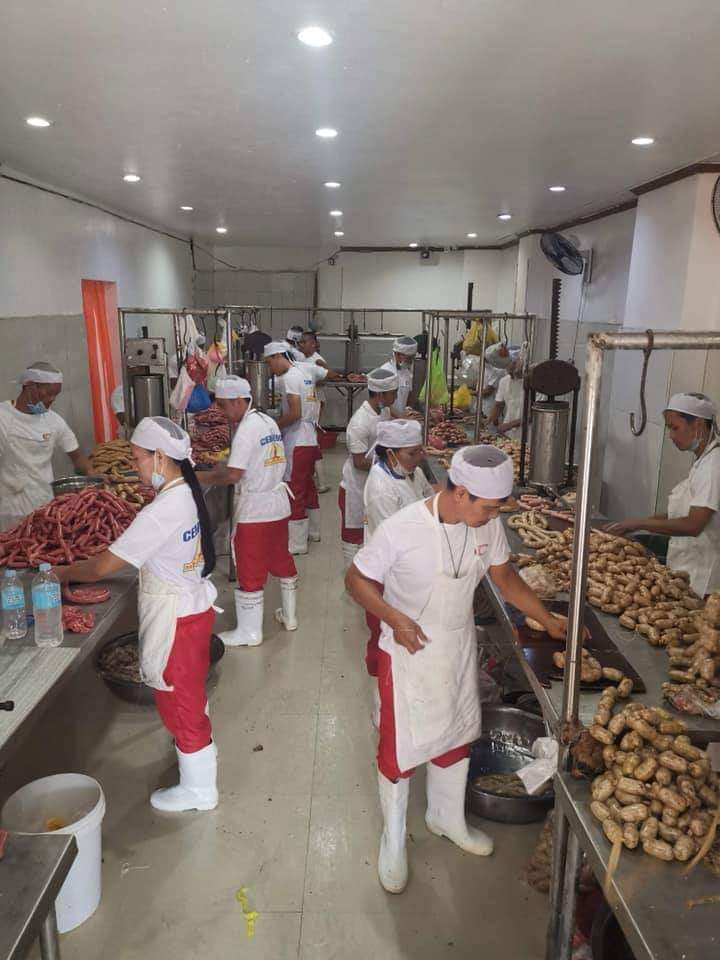Market vendors cooperative makes safe, delicious Cebuano chorizo
CEBU CITY, Philippines—Delicious and tempting – that’s how chorizo appears to most if not all Cebuanos.
It is after all a popular food choice among young and old alike.

Chorizo sold at the Carbon market stalls are process at the plants of the Carbon Market Vendors Development Cooperative (Cemvedco). CDND PHOTO
Over three years ago, however, chorizo lovers might have been turned off this food product if they saw how it was made at the Carbon Market meat section.
Workers of stall owners, without any food safety procedures, pushed the ground meat mix into paper-thin casing, usually made from animal intestine walls, then tied it up into smaller sizes.
Given the way chorizo is processed, the answer to a question about its being safe and clean would either be in the negative or a maybe.
Today, at least, at the Carbon Market stalls selling chorizo, the answer would be a definite yes.
The change is due to the efforts of the National Meat Inspection Service (NMIS) and the Cebu City Office of Veterinarian, who in 2016, informed meat vendors selling chorizo that they would strictly implement food safety standards.
Those who fail to follow these standards would no longer be allowed to sell this favorite food product.
The NMIS, in cooperation with local government units, has been tasked to monitor compliance of the Republic Act 9296 or Meat Inspection Code of the Philippines implementing rules and regulations.
The standards include Current Good Manufacturing Practices (cGMP) and Sanitation Standard Operating Procedures (SSOP).
These programs cover the whole process of production, storage and distribution of their processed meat products. NMIS said making chorizo in the open would no longer be applied.
Recognizing that many of its members could lose their livelihood, the Carbon Market Vendors Development Cooperative (Cemvedco) decided to put up the meat processing facility that would meet government standards, said Erwin Gok-ong, the chairman of the cooperative.
“We decided to put our own processing plant,” says Gok-ong.
According to Gok-ong, Cemvedco spent P15 million for the building and the equipment.
To upgrade skills and further develop knowledge on the trade, Gok-ong said they sent some staff to Manila to attend trainings on required standards for meat processing.
August 15, 2016 was an auspicious day for meat vendors at Carbon Market.
This day marked the beginning of the operations of a meat processing plant that complied with NMIS requirements.
In September 2018, Cemvedco operated a second meat processing plant. The cooperative invested P25 million for this facilit.
Plant 1 has a capacity to process 2,000 kilos daily while Plant 2 can process up to 5,000 kilos or five tons a day.
They now process an average of 3,000 kilos daily.

Erwin Gok-ong, chairman of Carbon Market Vendors Development Cooperative, says they are now operating two processing plants that makes chorizo and other meat products. CONTRIBUTED PHOTO
The members pay P4 per kilo of processed meat.
“We are collecting that amount in order to maintain the standards of the two plants and to pay for other operating expenses,” he says.
Cemvedco now processes an average of 2,000 kilos a day for chorizo alone.
The cooperative’s processing plant has other meat products such as chicken and pork longaniza, tocino, ham, chicken and pork bilog.
“We can assure the public that our products are safe, sanitary, delicious and affordable,” Gok-ong says.
The two facilities are compliant with sanitary standards.
Gok-ong and four others, including the plant’s food technician, operator and quality control personnel of the plant, first underwent a three-day-training on the cGMP.
Two months, later they also attended the SSOP training.
“We are already cGMP- and SSOP-compliant. Hopefully, this year we will undergo Hazard Analysis for Critical Control Points (HACCP), the next higher training for operation of a meat processing plant,” he tells CDN Digital.
“Our two meat processing plants are FDA (Food and Drug Authority) compliant. Lately, we received information from FDA Manila that our license to operate for the two processing plant is on the way,” Goc-ong says.
Goc-ong says they also aim to acquire an ISO standard certification for their two processing plant, which now processes 100 percent of processed meat products sold at Carbon Market.
An ISO standard guarantees safety in the global food chain.
The Cemvedco chairman explained having an ISO certification would enable them to access export markets like Japan. He says Cemvedco is initially looking at the members of the Association of Southeast Asian Nations (Asean) as a potential market. / celr
Disclaimer: The comments uploaded on this site do not necessarily represent or reflect the views of management and owner of Cebudailynews. We reserve the right to exclude comments that we deem to be inconsistent with our editorial standards.
